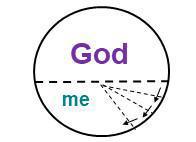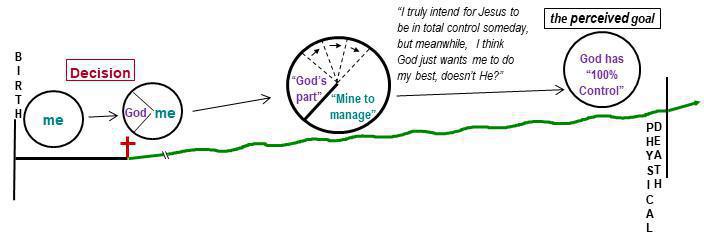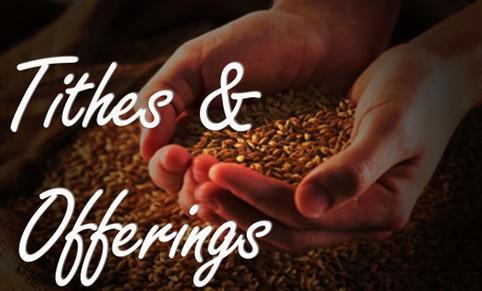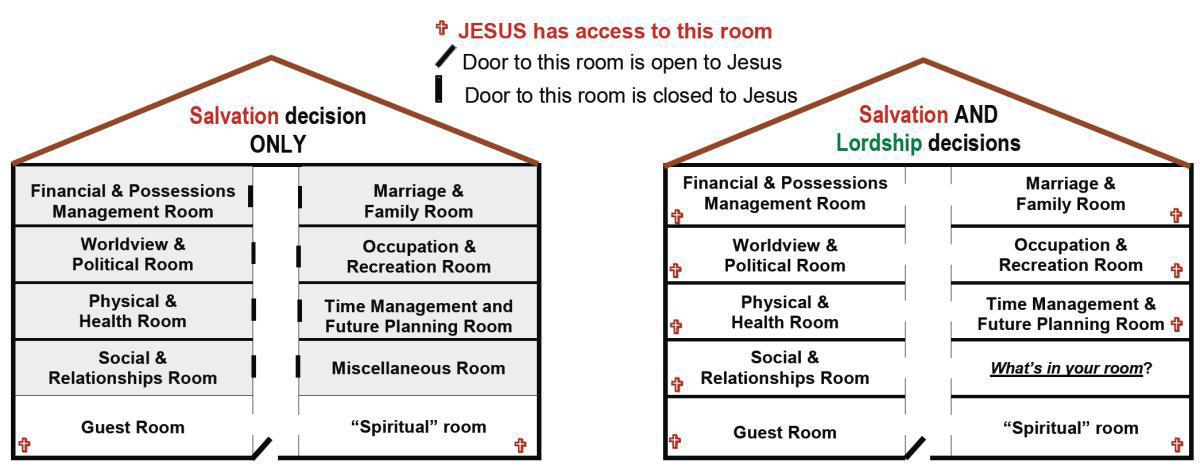The Normal Progressive Development of a Christian
(Lordship and Surrender)
After making the Salvation Decision, this diagram presents the Lordship decision as an event, which preferably takes place at conversion, followed by the growth process, in which God’s perspective of life is increasingly becoming my perspective.
Explanation of each element of the diagram follows.
This circle represents me as an unbeliever.
At birth my mind was like an empty whiteboard.
Through the conviction of the Holy Spirit, I must recognize my hopelessness, and make a “decision” to call out to the Lord for forgiveness and salvation.
As a new believer I receive eternal life (an event) and the Lord begins to dwell in me as the Person of the Holy Spirit.
During this phase it is natural for me to focus on “external behavior.”
This graphic represents my "worldview" -- my understanding about life, values, etc. acquired from birth to conversion as a result of the influence and learning from my parents, peers, media, culture, etc.
That understanding (my worldview) does not disappear at salvation. I now need to learn to walk with the Holy Spirit as a habit, and the function of discipleship or spiritual mentoring is to facilitate that process.
Note: Much of this understanding is contrary to God, but He alone can correctly manage the process of transformation.
Note: X = Understanding that IS contrary to God.
O = Understanding that is NOT NECESSARILY contrary to God.
In order for spiritual growth to continue, I need to come to an agreement with the Lord as to who is best capable of managing the growth process. Preferably this takes place at conversion, but often is not understood and accepted until later, unfortunately.
Typically, there are three motivators that will help me make the decision to surrender and accept the Biblical Master-servant relationship.
1) Persecution
2) Crisis
3) Personal discipleship
This graphic represents me, having made the decision to yield up my independence, and having acknowledged the rightful Lordship of Christ over my life.
I understand that God alone is capable of overseeing my life.
CONSIDER: Surrender consists of two parts.
- First I make the Lordship decision to surrender my will (an acknowledgment of His ownership of my life and the obvious implications of the Master-servant relationship.)
- This decision is then followed by the daily process of yielding up areas of my understanding. The Holy Spirit seeks my cooperation in allowing Him to transform me into an increasingly mature and fruitful Christian.
CONSIDER: A one-time surrender of the “will” precedes a progressive yielding up of “behavior.”
by Oswald Chambers
“True surrender is not simply surrender of our external life but surrender of our will - and once that is done, surrender is complete. The greatest crisis we ever face is the surrender of our will.
Yet God never forces a person's will into surrender, and He never begs. He patiently waits until that person willingly yields to Him. And once that battle has been fought, it never needs to be fought again.”
Jesus says, "If you want to be My disciple, you must give up your right to yourself to Me."
“And after you surrender - then what? Your entire life should be characterized by an eagerness to maintain unbroken fellowship and oneness with God.”
(Taken from My Utmost for His Highest by Oswald Chambers – Sep. 13. (c) l935 by Dodd Mead & Co., renewed (c) 1963 by the Oswald Chambers Publications Assn., Ltd., and is used by permission of Discovery House Publishers, Box 3566, Grand Rapids MI 4950l. All rights reserved.)
CONSIDER: “Inward transformation” will produce “outward behavior changes.”
THE GROWTH PROCESS: As I allow Him, God will use His Word and circumstances to gradually illuminate areas of my understanding that He wants to alter. This process is called “Sanctification”.
Romans 12:1-2 Therefore, brothers, by the mercies of God, I urge you to present your bodies as a living sacrifice, holy and pleasing to God; this is your spiritual worship. Do not be conformed to this age, but be transformed by the renewing of your mind, so that you may discern what is the good, pleasing, and perfect will of God.
Ephesians 4:22-24 You took off your former way of life, the old self that is corrupted by deceitful desires; you are being renewed in the spirit of your minds; you put on the new self, the one created according to God’s likeness in righteousness and purity of the truth.
“Spiritual growth” is the process in which God’s perspective of life is increasingly becoming my perspective. God does not want me to be a mindless robot, but rather a servant companion who increasingly enjoys fellowship with Him.
Note: The G’s represent areas of my understanding that God has changed to His perspective.
“As a Christian is transformed in his mind and is made more like Christ, he comes to approve and desire God’s will, not his own will for his life. Then he discovers that God’s will is what is good for him, and that it pleases God, and is complete in every way. It is all he needs. But only by being renewed spiritually can a believer ascertain, do, and enjoy the will of God.”
(Walvoord, John F., and Zuck, Roy B., The Bible Knowledge Commentary, (Wheaton, Illinois: Scripture Press Publications, Inc.) 1983, 1985.
The Abnormal Progressive Development of a Christian
(The Common Misconception of "Progressive" Surrender)
What is the important difference between this new diagram of the Abnormal Christian Life and the one we previously discussed that depicts the Normal Christian life? (shown below)
The Lordship decision is missing from this Christian’s life, resulting in a perceived partnership relationship with the Lord, with the goal that “one day God will have 100% control of my life”.
This diagram represents the abnormal development of a Christian.
This view of the Christian life usually results from a lack of personal spiritual mentoring and/or an unwillingness to surrender their will to His Lordship.
CONSIDER: If I view my relationship with God as depicted here, a critical error is to attribute to God, authority (Lordship) over only certain designated parts of my life, as if He had not bought all of me.
CONSIDER: If “Lordship” is presented as incremental surrender of my behavior, then I can conclude that the logical evidence of my “total surrender” (Lordship) is when I am totally obedient.
If I am in charge of this process, it can lead to cycles of frustration and discouragement, since I never see myself as being totally obedient.
CONSIDER: If “my time” at church on Sunday, reading my Bible daily, praying, etc. is understood to be God’s part (spiritual), doesn’t that imply that I have the right to manage the remaining hours in my day?
CONSIDER: Since tithes and offerings are “God’s share,” doesn’t that imply that I have the right to manage the rest of my material wealth?
Malachi 3:7-10 Since the days of your fathers, you have turned from My statutes; you have not kept them. "Return to Me, and I will return to you,” says the Lord of Hosts. But you ask: “How can we return?” “Will a man rob God? Yet you are robbing Me!” You ask: “How do we rob You?” “By not making the payments of the tenth and the contributions. You are suffering under a curse, yet you—the whole nation—are still robbing Me. Bring the full tenth into the storehouse so that there may be food in My house. Test Me in this way,” says the Lord of Hosts. “See if I will not open the floodgates of heaven and pour out a blessing for you without measure.
2 Corinthians 9:7-9 Each person should do as he has decided in his heart—not reluctantly or out of necessity, for God loves a cheerful giver. And God is able to make every grace overflow to you, so that in every way, always having everything you need, you may excel in every good work. As it is written: He scattered; He gave to the poor; His righteousness endures forever."
Mark 12:41-44 Sitting across from the temple treasury, He watched how the crowd dropped money into the treasury. Many rich people were putting in large sums. And a poor widow came and dropped in two tiny coins worth very little. Summoning His disciples, He said to them, “I assure you:This poor widow has put in more than all those giving to the temple treasury. For they all gave out of their surplus, but she out of her poverty has put in everything she possessed—all she had to live on.”
Proverbs 3:9-10 Honor the Lord with your possessions and with the first produce of your entire harvest; then your barns will be completely filled, and your vats will overflow with new wine.
1 Timothy 6:6-10; 17-19 But godliness with contentment is a great gain. For we brought nothing into the world, and we can take nothing out. But if we have food and clothing, we will be content with these. But those who want to be rich fall into temptation, a trap, and many foolish and harmful desires, which plunge people into ruin and destruction. For the love of money is a root of all kinds of evil, and by craving it, some have wandered away from the faith and pierced themselves with many pains.
Instruct those who are rich in the present age not to be arrogant or to set their hope on the uncertainty of wealth, but on God, who richly provides us with all things to enjoy. Instruct them to do what is good, to be rich in good works, to be generous, willing to share, storing up for themselves a good reserve for the age to come, so that they may take hold of life that is real.
Also see Matthew 6:19-33 Click HERE to read.
Additional Problems Associated with Progressive Surrender Perspective:
1) It tends to result in my asking, “will God take advantage of me?” such as:
a. “What will He ask me to do that I can’t do, or don’t want to do?”
b. “What will He keep me from doing that I want to do?”
c. “What will He take away that I hold dear?”
d. “Will God fail me if I entrust “this” to Him?
2) I tend to view myself as being in charge of the process of spiritual growth.
In this perspective I feel I can make the determination as to what can and should be yielded up to the Lord. In other words, I set down the rules and limits.
This perception is typically based on pride, an inflated view of my own discernment and capabilities, and a distorted understanding of God’s character. (If needed, review the Scripture verses related to “God’s Character” in Lesson 1-5.)
CONSIDER: There is no reasonable logic for rejecting His yoke of Lordship.
A lack of acceptance is typically based on:
1) a fear of the unknown,
2) an unwillingness to relinquish perceived control,
3) an unwillingness to leave a comfort zone, or
4) an over-estimation of my own capabilities to determine and manage my future.
Matthew 11:28-30 NIV Jesus said: “Come to me, all you who are weary and burdened, and I will give you rest. Take my yoke upon you and learn from me, for I am gentle and humble in heart, and you will find rest for your souls. For my yoke is easy and my burden is light.”
Jesus did not say, “learn about Me, and if you like how I do things, then take My yoke!”
CONSIDER: The real question: Is God trustworthy?
If God were like you or me, we would have good reason to be fearful.
Ask yourself:
- Does God love me? If God’s character is as described in the Bible, and if He promises to do only that which is in my best interest, what do I have to fear?
- Did He design me?
- Did He give me life?
- Does He maintain my very existence?
- Who besides God knows what will really satisfy me?
- Does He alone know what is best for me?
- Does He alone know how to shape my life and use me for His eternal purposes?
CONSIDER: God’s ownership of me is a factual truth, which is not dependent on my acknowledgment of it.
I do not bestow ownership, I can only acknowledge and act upon what He states to be already true.
New believers will typically not be resistant to this truth, because they don’t have preconceived ideas of God’s expectations. In contrast, older believers tend to accept this truth intellectually, but be resistant to the implications.
What are the implications of ownership? What rights or authority are generally understood to be conveyed by ownership?
Do I acknowledge that I live in a spiritual “kingdom”, not a spiritual democracy? What is the difference?
1 Corinthians 6:19-20 Don’t you know that your body is a sanctuary of the Holy Spirit who is in you, whom you have from God? You are not your own, for you were bought at a price. Therefore glorify God in your body.
If God loves me, can only do what is in my best interest, and never makes mistakes, what would be a logical reason for not embracing Him as Lord?
Analogy: The Rooms of My “House”
Does Jesus have access to all the rooms of my house?
A story of two believers…
When Jesus knocked at the front door of their hearts (Rev. 3:20) and asked permission to enter, both of these persons gladly received Him, realizing that His absence had been the reason for the emptiness they had always sensed (the Salvation decision).
Revelation 3:20 Listen! I stand at the door and knock. If anyone hears My voice and opens the door, I will come in to him and have dinner with him, and he with Me.
As new believers each was overjoyed that Jesus was in their house and that their sins were forgiven. Each had a new happiness and an assurance of going to heaven.
Jesus was allowed to occupy the “Guest Room” – which was always kept clean and presentable for visitors – and He was also allowed to reside in the “spiritual” room – where the believer went to church services, prayed and read the Bible.
But one day soon Jesus asked each of them for permission to make some changes in other areas of their houses, such as adopting new management procedures, rearranging items, throwing out worthless things, and bringing in some new items.
Jesus asked for access to every “room”. Each believer had a different response.
Salvation decision ONLY
The believer in the house on the left was reluctant to grant Jesus’ request on the grounds that he was not yet prepared for major changes.
However, he would thoughtfully consider any suggestions, and might allow some minor changes that wouldn’t seriously disrupt his lifestyle and future plans.
Jesus informed him that He (Jesus) is the only One who is really capable of making the correct decisions as to the above changes, since He alone knows what is needed to make the house into a suitable dwelling for God, one that would be usable for His eternal purposes.
Jesus clearly explained His good intentions, even guaranteeing that the believer would be more than totally satisfied with the finished product.
The believer replied that while the offer sounded very attractive, he considered himself to be a good judge of the appropriateness and non-disruptive pace of any changes, based on his past experience. He expressed his appreciation for Jesus’ presence and blessings, and his desire to make the Guest Room as comfortable as possible for Him.
He assured Jesus that as time went on, he would certainly give Him access to other rooms.
“Jesus, I’m thankful You live in my house! I’m really happy to know that I can count on You to be there whenever I find circumstances too difficult to manage on my own.”
Salvation AND Lordship decisions
The believer in the house on the right was also reluctant to grant Jesus’ request on the grounds that he was not yet prepared for major changes.
However, he was aware that he had been bought at a great price and therefore Jesus was the rightful Owner.
He reasoned, “If Jesus owns me, how can I deny Him access to every room of His house?” (the Lordship decision to acknowledge Jesus as Master of his life).
The believer was somewhat apprehensive, as he didn’t understand how this decision would impact his future. But he reasoned that since Jesus had done so much for him already, it seemed logical that He was trustworthy to continue doing what was in his best interest.
The believer's prayer
“Jesus, welcome to my house! I don’t know what You have planned for my life, and to be honest I have some fears, but I fling all the doors to my rooms open, because I understand that you own me and can only do what's in my best interest. I will need your help because I can't do it myself. I want to trust you alone about what my house needs to look like - what my life needs to look like. I give my "house" to you because I know that you know what's best for me.
Thank you for letting me be part of Your plans. Wow!”
1 Corinthians 6:19-20 Don’t you know that your body is a sanctuary of the Holy Spirit who is in you, whom you have from God? You are not your own, for you were bought at a price. Therefore glorify God in your body.
While making the Lordship decision gives the Lord access to all the rooms in my house, He alone decides what needs to be changed.
The Holy Spirit will manage these changes as He determines best. This is part of the continuing growth process.
Watch this video to further contemplate making the decision that Jesus is your Lord, not just your Savior.
What Rooms are in MY House?
Use the “Rooms of My House” blank diagram to complete your personal inventory.
WHAT ROOMS ARE IN MY HOUSE? Can I trust God with ALL the rooms?
I should think carefully and prayerfully if Jesus has access to my entire house – after all, He owns it!
Are the doors open or closed to all the rooms? Is there a “closet” in one room that I deny Him access to?
I need to pray honestly and sincerely about giving Jesus access to ALL areas of my life.
Upon viewing the finished product, I will not regret having made the decision to choose Him as the Master of my life.
Note: To print you own “Rooms of My House” blank diagram and complete your own “personal inventory” click the PDF link at the end of this lesson .


















